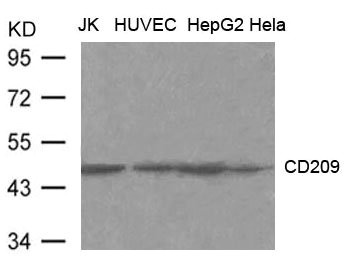
Western blot analysis of extract from JK, HUVEC, HepG2 and Hela cells using CD209(DC-SIGN) Antibody
CD209 Antibody
CSB-PA143864
TargetCD209
Product group Antibodies
Overview
- SupplierCusabio
- Product NameCD209 Antibody
- Delivery Days Customer20
- FormulationLiquid
- Gene ID30835
- Target nameCD209
- Target descriptionCD209 molecule
- Target synonymsCD209 antigen; CDSIGN; CLEC4L; C-type lectin domain family 4 member L; DC-SIGN; DC-SIGN1; dendritic cell-specific ICAM-3-grabbing non-integrin 1; dendritic cell-specific intercellular adhesion molecule-3-grabbing non-integrin; dendritic cell-specific intracellular adhesion molecules (ICAM)-3 grabbing non-integrin; hDC-SIGN; HIV gpl20-binding protein
- Protein IDQ9NNX6
- Protein NameCD209 antigen
- Scientific DescriptionPathogen-recognition receptor expressed on the surface of immature dendritic cells (DCs) and involved in initiation of primary immune response. Thought to mediate the endocytosis of pathogens which are subsequently degraded in lysosomal compartments. The receptor returns to the cell membrane surface and the pathogen-derived antigens are presented to resting T-cells via MHC class II proteins to initiate the adaptive immune response. Probably recognizes in a calcium-dependent manner high mannose N-linked oligosaccharides in a variety of pathogen antigens, including HIV-1 gp120, HIV-2 gp120, SIV gp120, ebolavirus glycoproteins, cytomegalovirus gB, HCV E2, dengue virus gE, Leishmania pifanoi LPG, Lewis-x antigen in Helicobacter pylori LPS, mannose in Klebsiella pneumonae LPS, di-mannose and tri-mannose in Mycobacterium tuberculosis ManLAM and Lewis-x antigen in Schistosoma mansoni SEA. On DCs it is a high affinity receptor for ICAM2 and ICAM3 by binding to mannose-like carbohydrates. May act as a DC rolling receptor that mediates transendothelial migration of DC presursors from blood to tissues by binding endothelial ICAM2. Seems to regulate DC-induced T-cell proliferation by binding to ICAM3 on T-cells in the immunological synapse formed between DC and T-cells. Geijtenbeek T.B.H., Kwon D.S., Torensma R., van Vliet S.J. Cell 100:587-597(2000) Geijtenbeek T.B.H., Krooshoop D.J., Bleijs D.A., van Vliet S.J. Nat. Immunol. 1:353-357(2000) Engering A., Geijtenbeek T.B.H., van Vliet S.J., van Kooyk Y.J. Immunol. 168:2118-2126(2002)
- Storage Instruction-20°C or -80°C
- UNSPSC12352203
